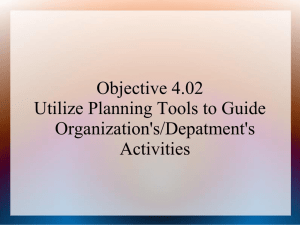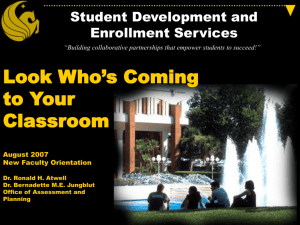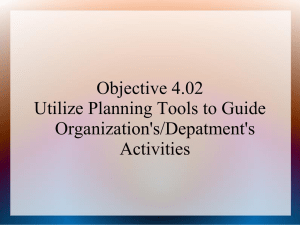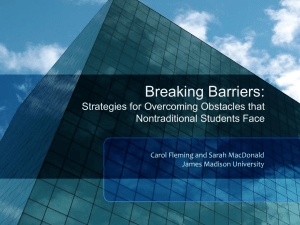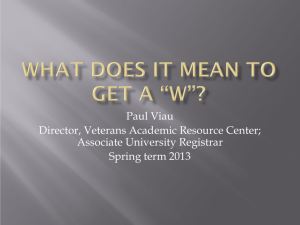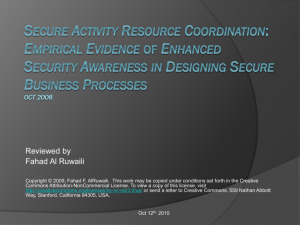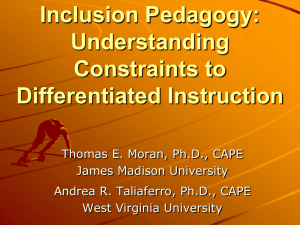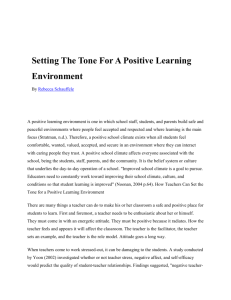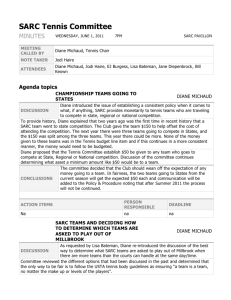Study Skills and Seminar
advertisement
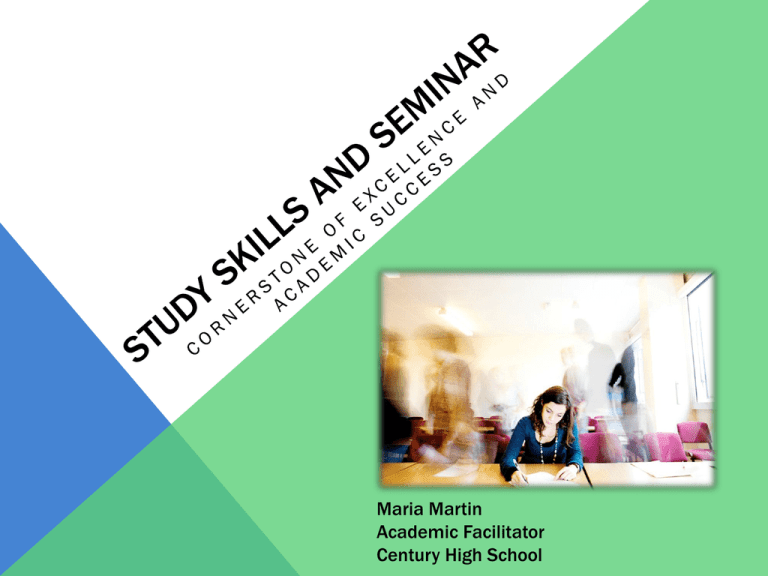
Maria Martin Academic Facilitator Century High School WHY STUDY SKILLS? • Shift Happens http://www.p21.org/index.php IMPLICATIONS • What skills do students need in order to be college and career ready? • It is insufficient for learners to merely attain concepts in isolation, yielding knowledge that frequently remains static. • Rather, students must form and continually adapt their understanding of the world as they collaborate with other students to solve authentic problems presented in meaningful tasks (Bentley, Ebert, & Ebert, 2007). IMPLICATIONS • In addition to skills and knowledge, we need to develop capabilities. • The amount of technical information generated in our world is doubling every 2 years. -- For students starting a 4 year degree, half of what they learned in their first year of study will be outdated by their 3rd year of study! • The U.S. Department of Labor estimates that today's learner will have 10-14 jobs... By the age of 38. http://ezinearticles.com/?Shift-Happens--How-Can-We-Prepare-For-OurFuture?&id=2328498 WHAT ARE THE “NEW” SKILLS • • • • • Communication Collaboration Creativity Critical Thinking New Exams are shifting in this direction. Ken Kay, president of Partnership for the 21st Century, believes that we need to focus on fusing the three Rs of education with the four Cs. http://www.plsweb.com/ProductsResources/Newsletter/February-2011 WHAT DOES SKILLS ARE EMPLOYERS LOOKING FOR? Business Advisory Board from CHS Recommends: • Meet Deadlines. (Critical Thinking) • Work as a member of a team. (Collaboration) • Be able to write for a variety of purposes. (Creativity) • Be able to present your ideas effectively. (Communication) • Understand what you read. (Communication) • Professionalism • Ethics and Social Responsibility HOW DO WE PREPARE OUR STUDENTS? At School •Seminar Class •Flex •Individual Support •Peer Support •Counselors •Advisor •Case Manager At Home •Help with goal setting •Develop a plan •Involved in Scheduling •Space and Time for Studying •Use Resources •Communicate with Teachers WHERE DO WE LEARN STUDY SKILLS? SEMINAR • Assist ninth grade students in making a smooth transition to High School. • Lessons are designed to teach study skills. • Students are oriented to the media center, guidance services, career center and computer lab • Emphasis on the development of self-knowledge, goal setting, career exploration, and decision-making. • Develop an educational career plan • These skills and concepts have been found to be key factors in the successful transition from middle school to high school. INCREASING STUDY SKILLS THROUGH UNDERSTANDING OF SELF • What is your learning style? • Use the following link and survey to determine your learning style. • http://www.ldpride.net/learningstyles.MI.htm • Knowing your learning style will help you develop coping strategies to compensate for your weaknesses and capitalize on your strengths. STUDY SKILLS FOR SUCCESS • Time Management • Getting your "free" time under control • Develop Study Habits • Regular Study Sessions • Review notes daily • The Ability to Set Attainable Goals • SMART Goals • Ask Questions • • • • Take Good Notes Use Flex Complete Assignments Maintain an organizational system • Use Agenda Book or Electronic Calendar • Divide long term work into parts Having Trouble? Click on the link to learn more about improving your study skills: http://coe.jmu.edu/learningtoolbox/studentstart.htm TOP 5 STUDY STRATEGIES • Test yourself • Practice quizzes • Self-tests slow down the forgetting of material you've studied. • Move around • Changing up where you study can help you retain more information. “ • If you move around and study the same material in several places," he says, "you may be forming multiple associations for the same material. New York Times reporter Benedict Carey has written about the research. He tells NPR's Neal Conan that though a lot of ideas about learning make intuitive sense, they're actually way off. TOP 5 STUDY STRATEGIES CONTINUED • Mix it up • Alternating between different facets of a subject in a single sitting can "leave a deeper impression on the brain.“ • Space it out • Information learned in a hurry is lost just as fast. • Motivation and Discipline • "Studying can sort of be incorporated into a more varied life, much more easily than we thought." Want to find out where your study skills rank? Try this site: http://sarc.sdes.ucf.edu/ WANT TO BE SUCCESSFUL IN HIGH SCHOOL? (DEVELOPED BY TEACHERS AND ADMINISTRATORS) Develop strong note taking skills. Always be a student and take all opportunities to learn something new. Time management is critical to success. Know your learning style and interests. Take care of yourself. Use your resources. WANT TO BE SUCCESSFUL IN HIGH SCHOOL? (DEVELOPED BY CHS STUDENTS) Stay Healthy Don’t Procrastinate Come Prepared Get Involved Take Good Notes Be Organized Ask Questions Do Your Homework Set Goals QUESTIONS? • Resources used in this presentation: • http://www.p21.org/index.php • http://sarc.sdes.ucf.edu/ • http://coe.jmu.edu/learningtoolbox/studentstart.htm • http://www.ldpride.net/learningstyles.MI.htm • http://www.plsweb.com/ProductsResources/Newsletter/February-2011 • http://ezinearticles.com/?Shift-Happens---How-CanWe-Prepare-For-Our-Future?&id=2328498

